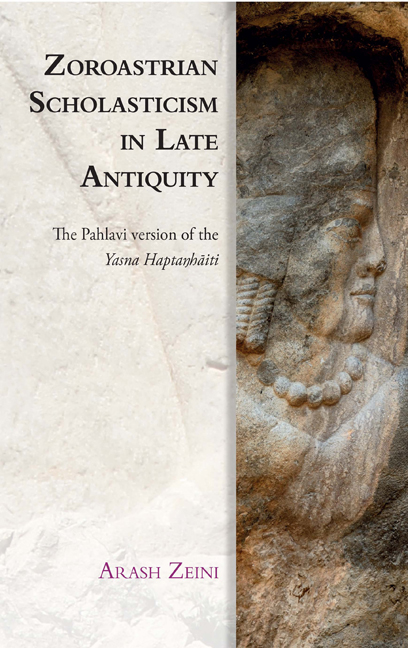Book contents
- Frontmatter
- Contents
- List of Figures
- List of Tables
- Acknowledgements
- Series Editor’s Preface
- Preface
- Conventions
- Abbreviations
- Dedication
- Part I Introduction
- 1 Introduction
- 2 The Zand
- 3 Scholasticism
- 4 Fire in Zoroastrianism
- 5 Precis: Yasn Ī Haft Hād
- Part II Text and translation
- 6 PY 35
- 7 PY 36
- 8 PY 37
- 9 PY 38
- 10 PY 39
- 11 PY 40
- 12 PY 41
- Part III Miscellaneous Observations
- 13 PY
- 14 PY 36
- 15 PY 37
- 16 PY 38
- 17 PY 39
- 18 PY 40
- 19 PY 41
- Part IV Epilogue
- 20 Reflections on the Zand
- Appendices
- Appendix A Transliteration and Apparatus
- Appendix B Y 9.1
- Appendix C Fire in the Older Avesta
- Appendix D Iϑā
- Appendix E MSS Concordance
- Bibliography
- Index of Passages Quoted
Appendix D - Iϑā
Published online by Cambridge University Press: 14 October 2020
- Frontmatter
- Contents
- List of Figures
- List of Tables
- Acknowledgements
- Series Editor’s Preface
- Preface
- Conventions
- Abbreviations
- Dedication
- Part I Introduction
- 1 Introduction
- 2 The Zand
- 3 Scholasticism
- 4 Fire in Zoroastrianism
- 5 Precis: Yasn Ī Haft Hād
- Part II Text and translation
- 6 PY 35
- 7 PY 36
- 8 PY 37
- 9 PY 38
- 10 PY 39
- 11 PY 40
- 12 PY 41
- Part III Miscellaneous Observations
- 13 PY
- 14 PY 36
- 15 PY 37
- 16 PY 38
- 17 PY 39
- 18 PY 40
- 19 PY 41
- Part IV Epilogue
- 20 Reflections on the Zand
- Appendices
- Appendix A Transliteration and Apparatus
- Appendix B Y 9.1
- Appendix C Fire in the Older Avesta
- Appendix D Iϑā
- Appendix E MSS Concordance
- Bibliography
- Index of Passages Quoted
Summary
Herb 16.3 hād ka-š yašt pad wināhgārīh nē kard estēd ud ka-z harw bār-ē iϑā āat̰ ẏazamaide ud aṣ̌əm vohū ē gōwēd rāy <nē> tuwān guftan ud nē gōwēd āz- iš drāyān-jōyišnīh kunišn ka harw 2 ēk-ē tuwān guftan iϑā āat̰ ẏazamaide gōwēd ayāb aṣ̌əm vohū gōwēd ka-š aṣ̌əm-*ē tuwān būd guftan ud nē gōwēd ēdōn wināhgār bawēd ciyōn ka-š hamāg tuwān būd guftan u-š ēk-iz nē guft (Kotwal and Kreyenbroek 1992: 74)
Yes. If he has failed to perform the ritual in sin, and also each time when he might say the iϑā āat̰ẏazamaide and aṣ̌əm vohū, (but) is unable to say it and does not say it, then, too, he is to be made guilty of chattering while eating. (And) when he is able to say one of the two, he can say the iϑā āat̰ẏazamaide or the aṣ̌əm vohū. If he could have said one aṣ̌əm vohū and he does not say it, he is thus sinful, as he could have recited the whole (prayer), and did not say even one.
N 10.49 ka-z-iš ranjagīhā ēn and az pāy gōwišn bīšāmrūd ud srīšāmrūd, ud šnūman wizārišnīh ud wāz-gīrišnīh ud iϑā āat̰ẏazamaidē kardag-ē
Even if it is troublesome, one should recite the following standing up: the passages to be recited twice, those to be recited three times, the recitation of the šnūman(s), the taking of the bāj, and a section of iϑā āat̰ẏazamaidē. (Kotwal and Kreyenbroek 1995: 74–7)
N 10.50 pad iϑā harw tis-ē pad xwarišn mehmān be nigērišn pas ka nihuft estēd ā-š weh
[A]t iϑā he should gaze at all the things which are amenable to consumption; afterwards it is better if they are covered. (Kotwal and Kreyenbroek 1995: 76–7)
N 10.56 ēn 3 ud 4 aṣ̌əm vohū *anēraxt cāšt estēd zōt ka iϑā aṣ̌əm vohū gōwēd ā (*nē) šāyēd ka aṣ̌əm iϑā gōwēd ā nē šāyēd rāspīgān pēš ud pas
These three and four a.v. are taught without dissension. If the zōt recites iϑā (followed by) a.v. it is not (?) permissible. If he recites a.v. (followed) by iϑā it is not permissible, (for) the rāspīs’ (recitation becomes) mixed up. (Kotwal and Kreyenbroek 1995: 78–81)
- Type
- Chapter
- Information
- Zoroastrian Scholasticism in Late AntiquityThe Pahlavi Version of the Yasna Haptaŋhāiti, pp. 371 - 373Publisher: Edinburgh University PressPrint publication year: 2020



